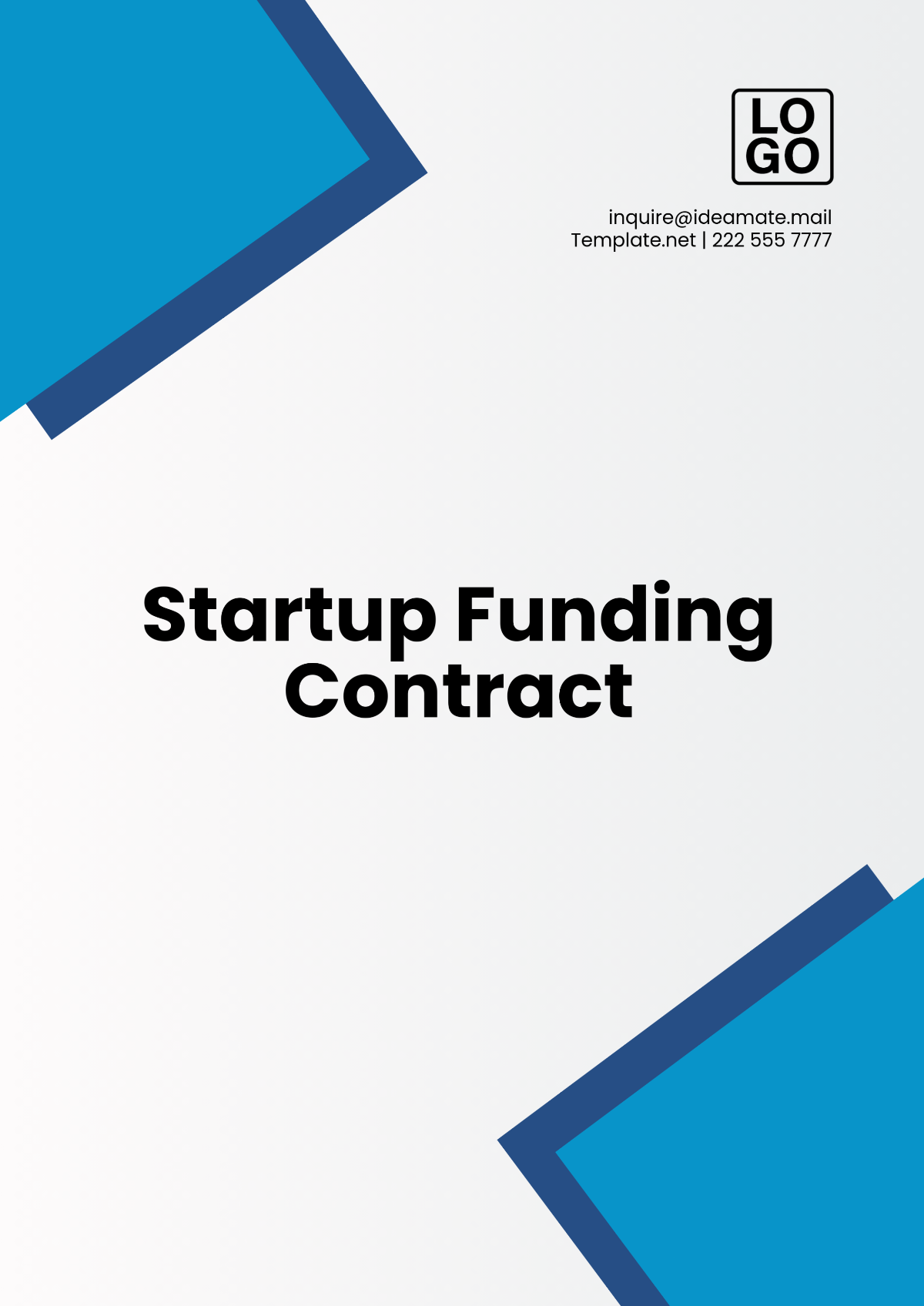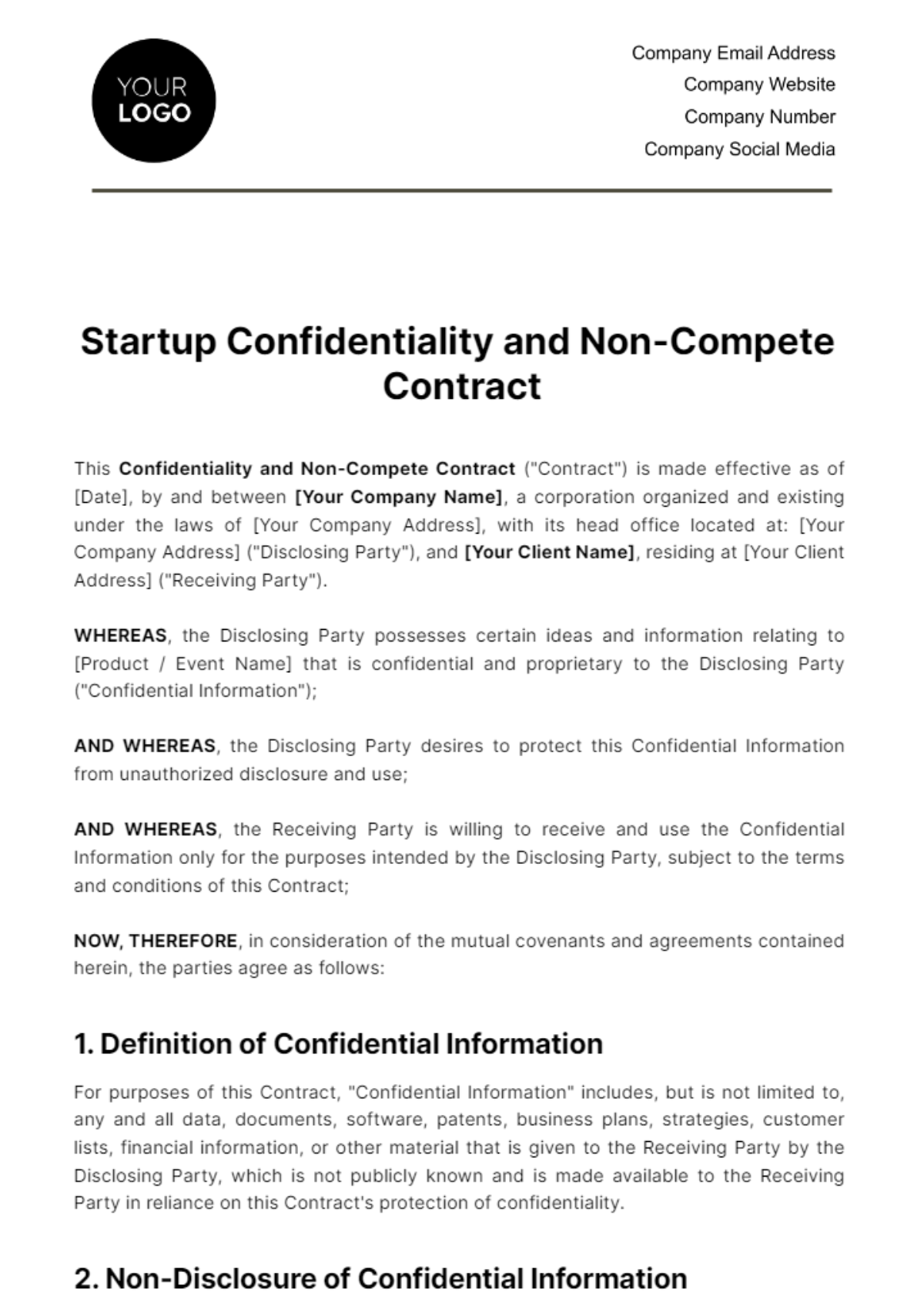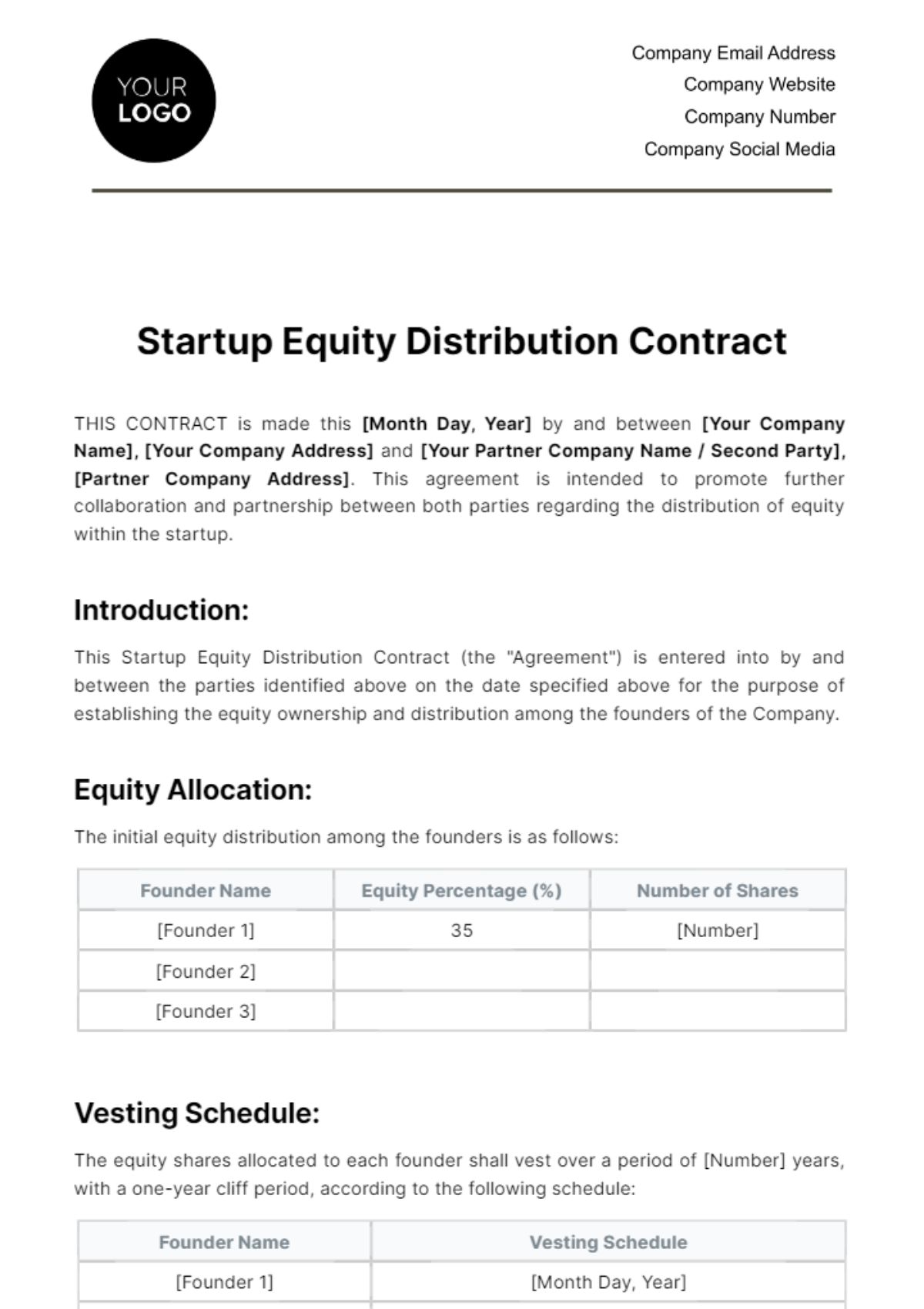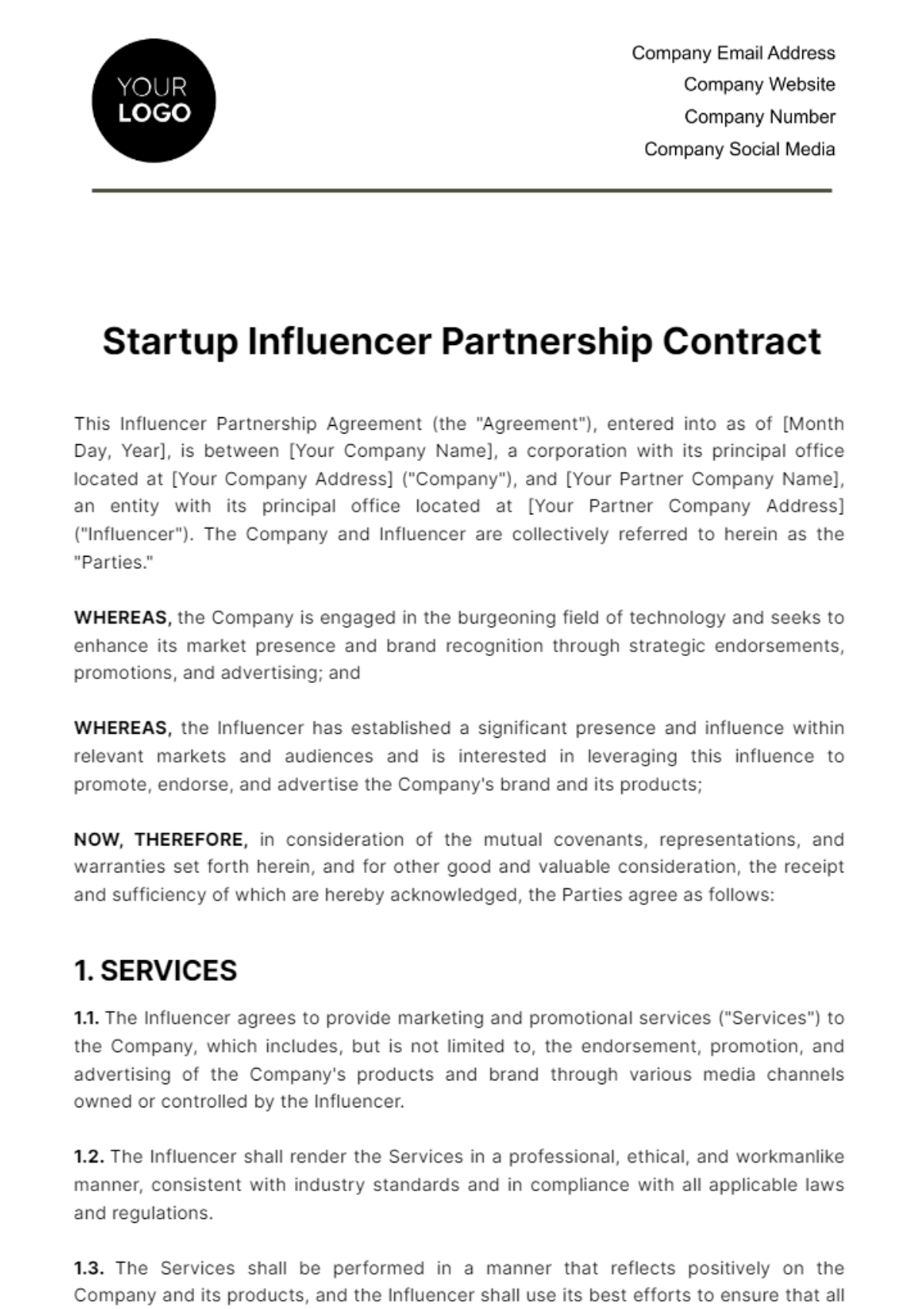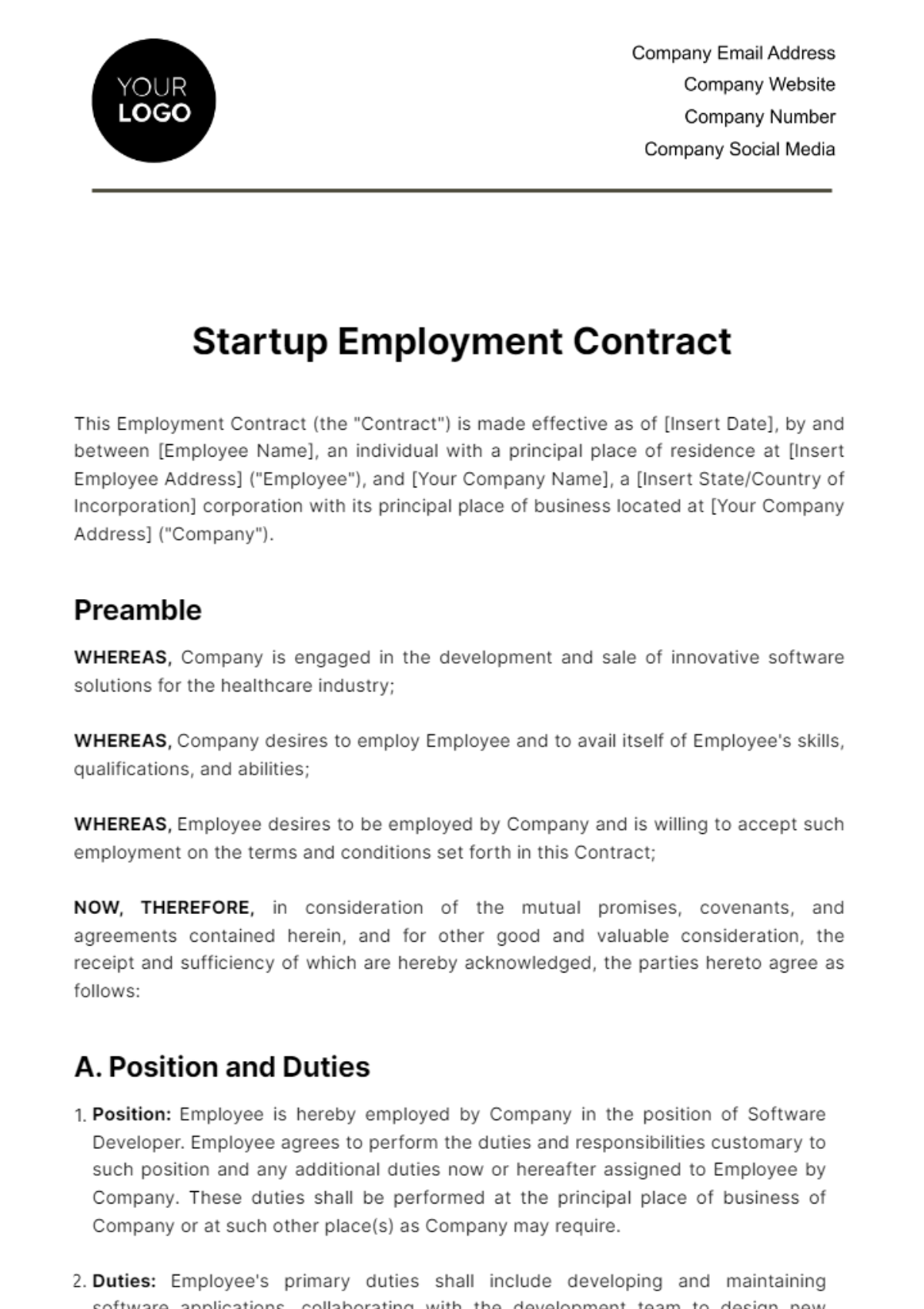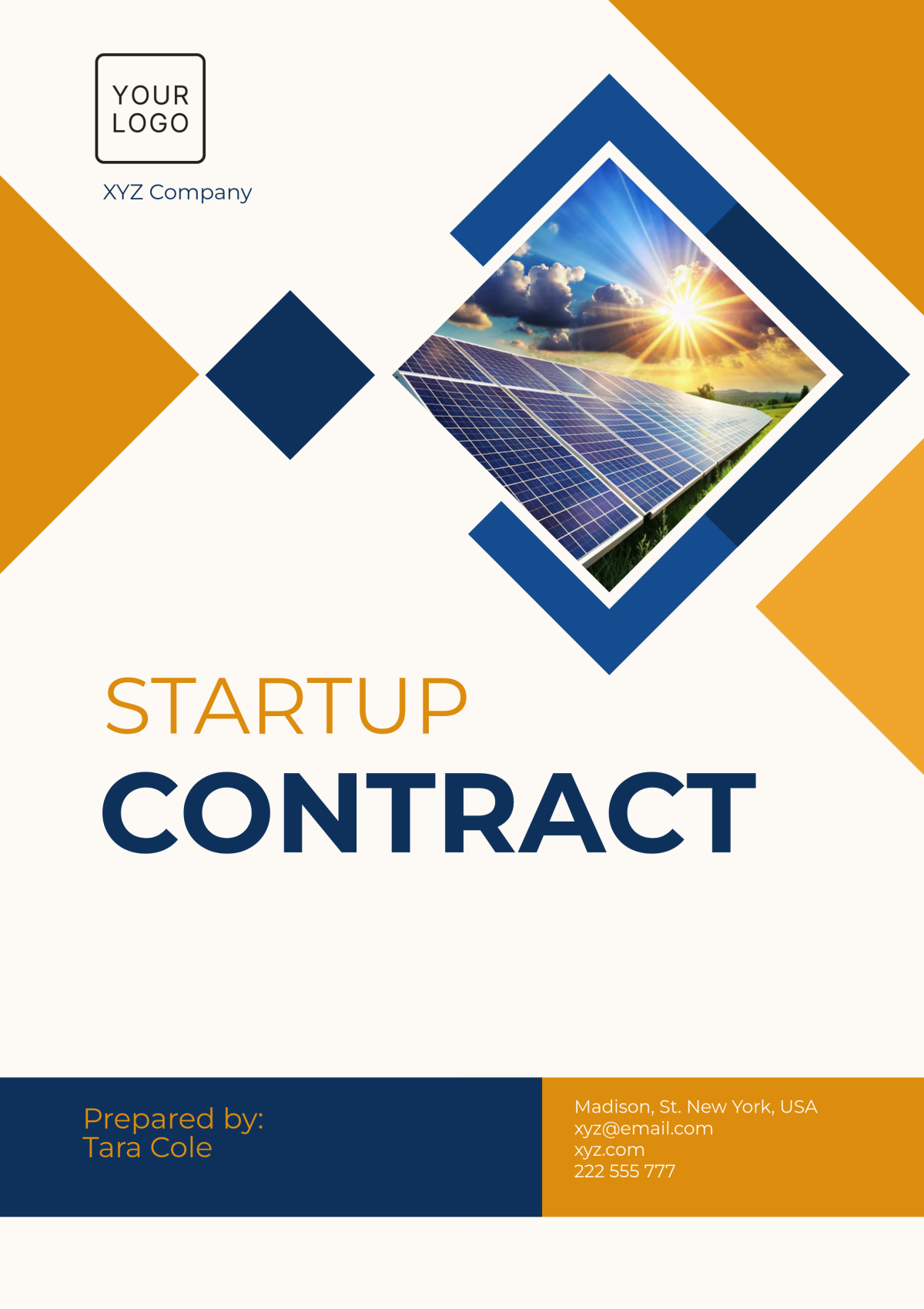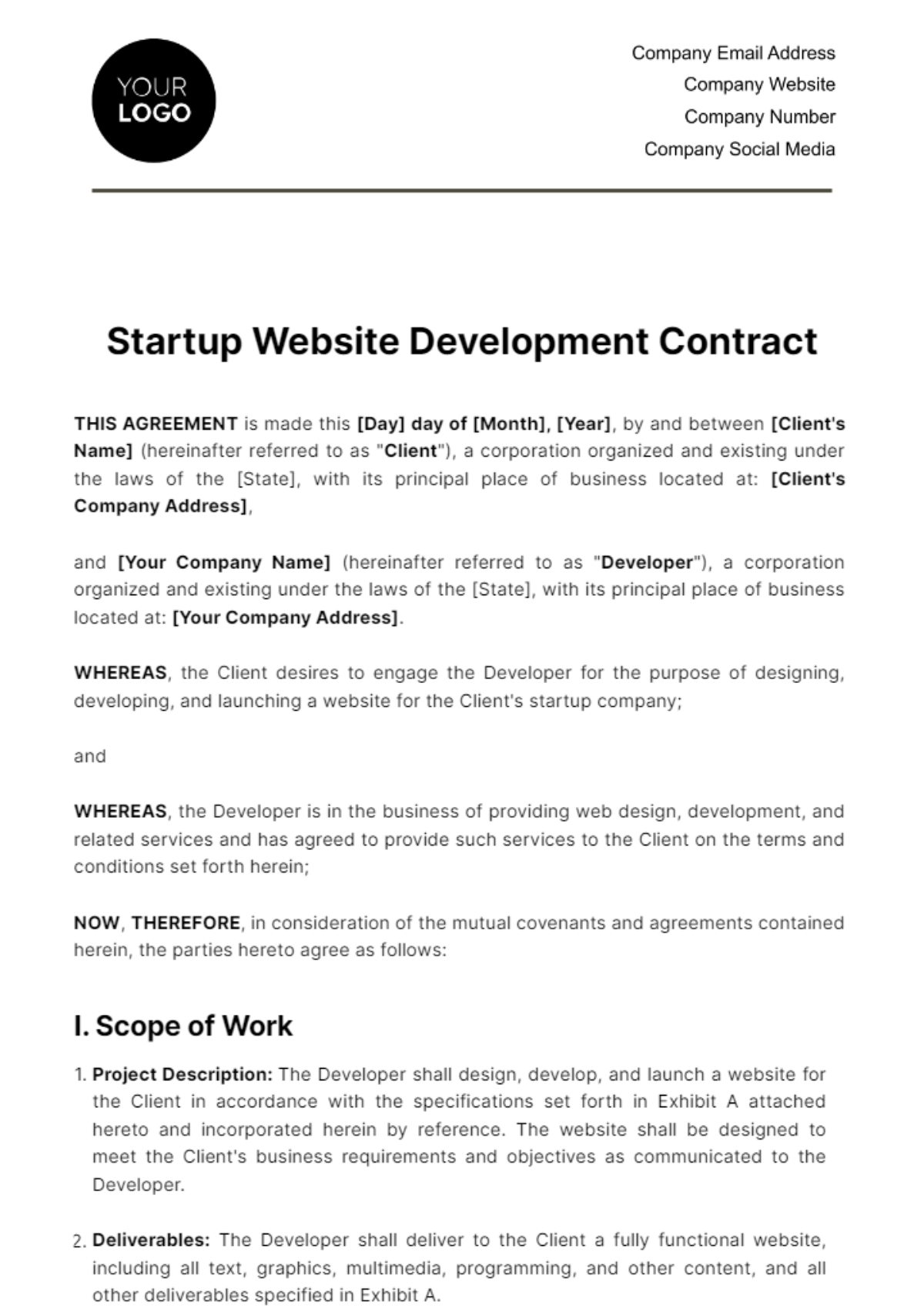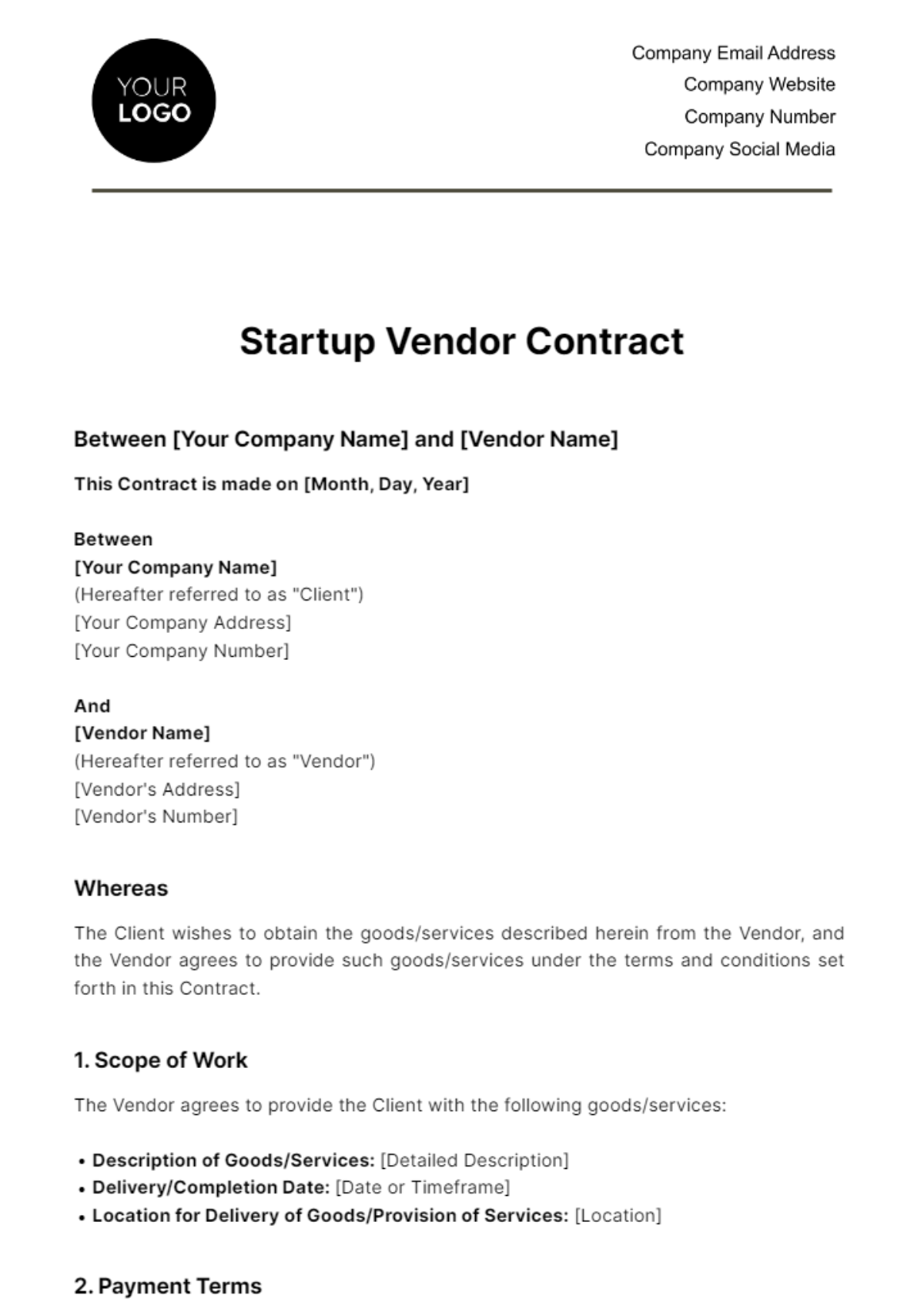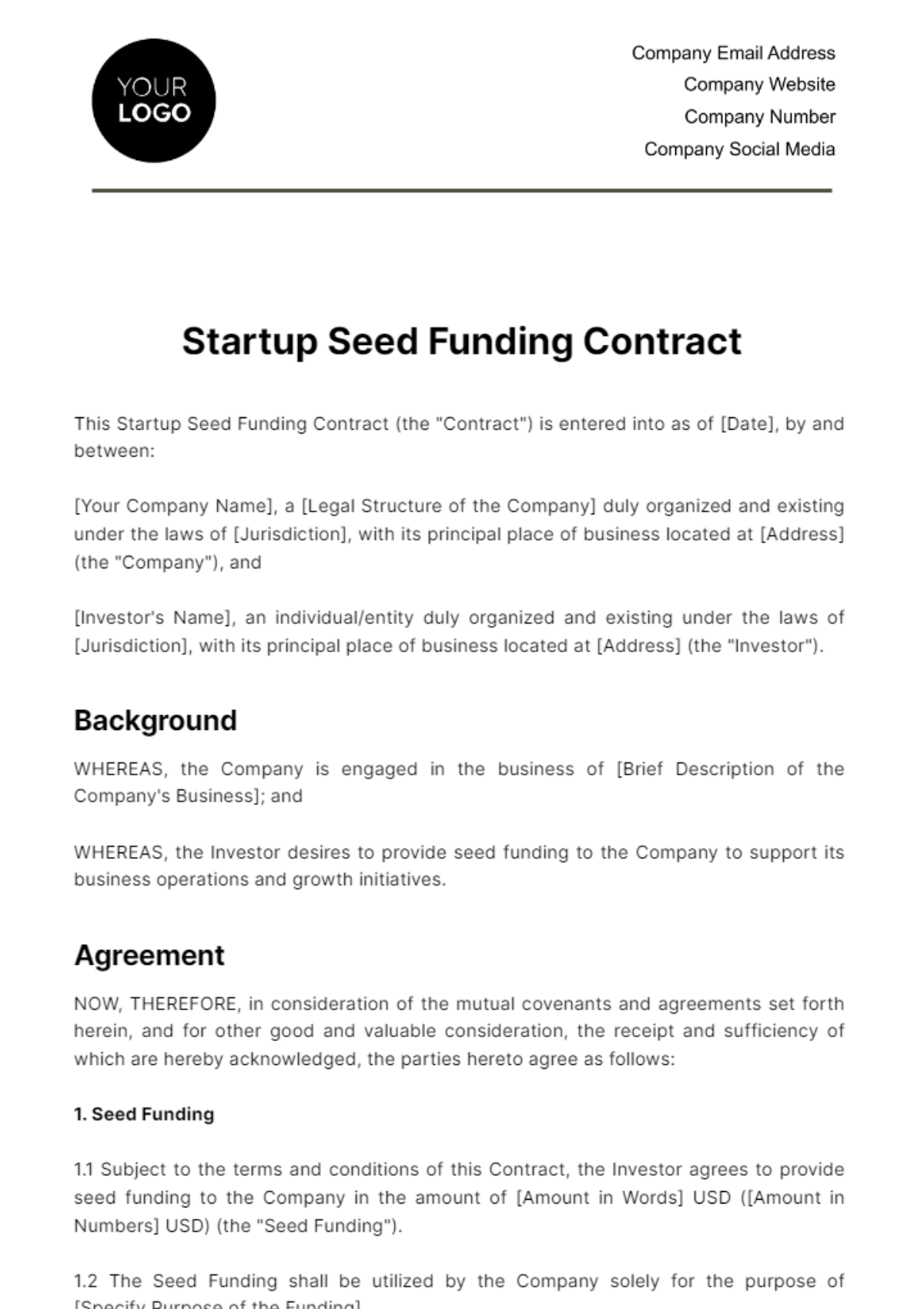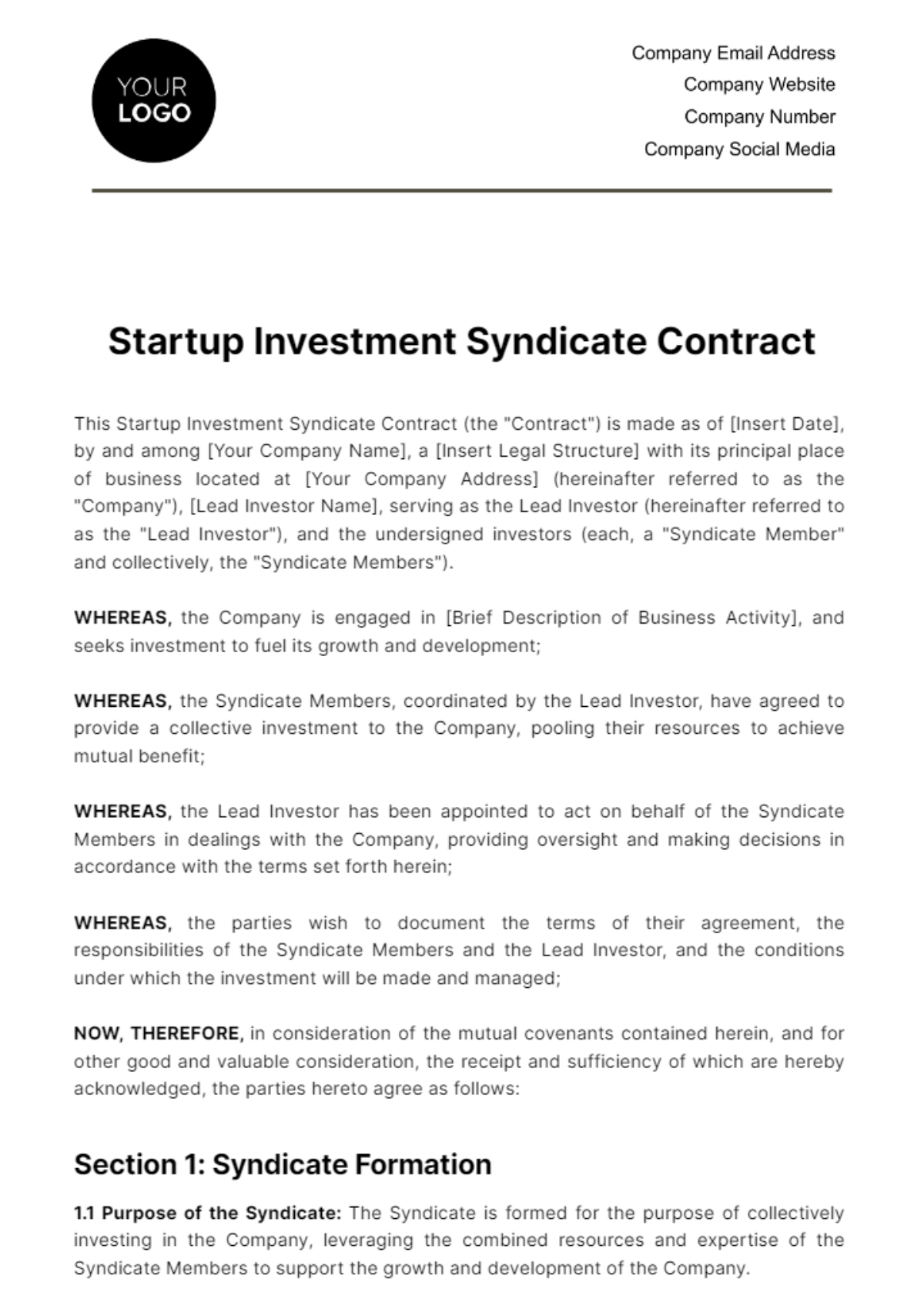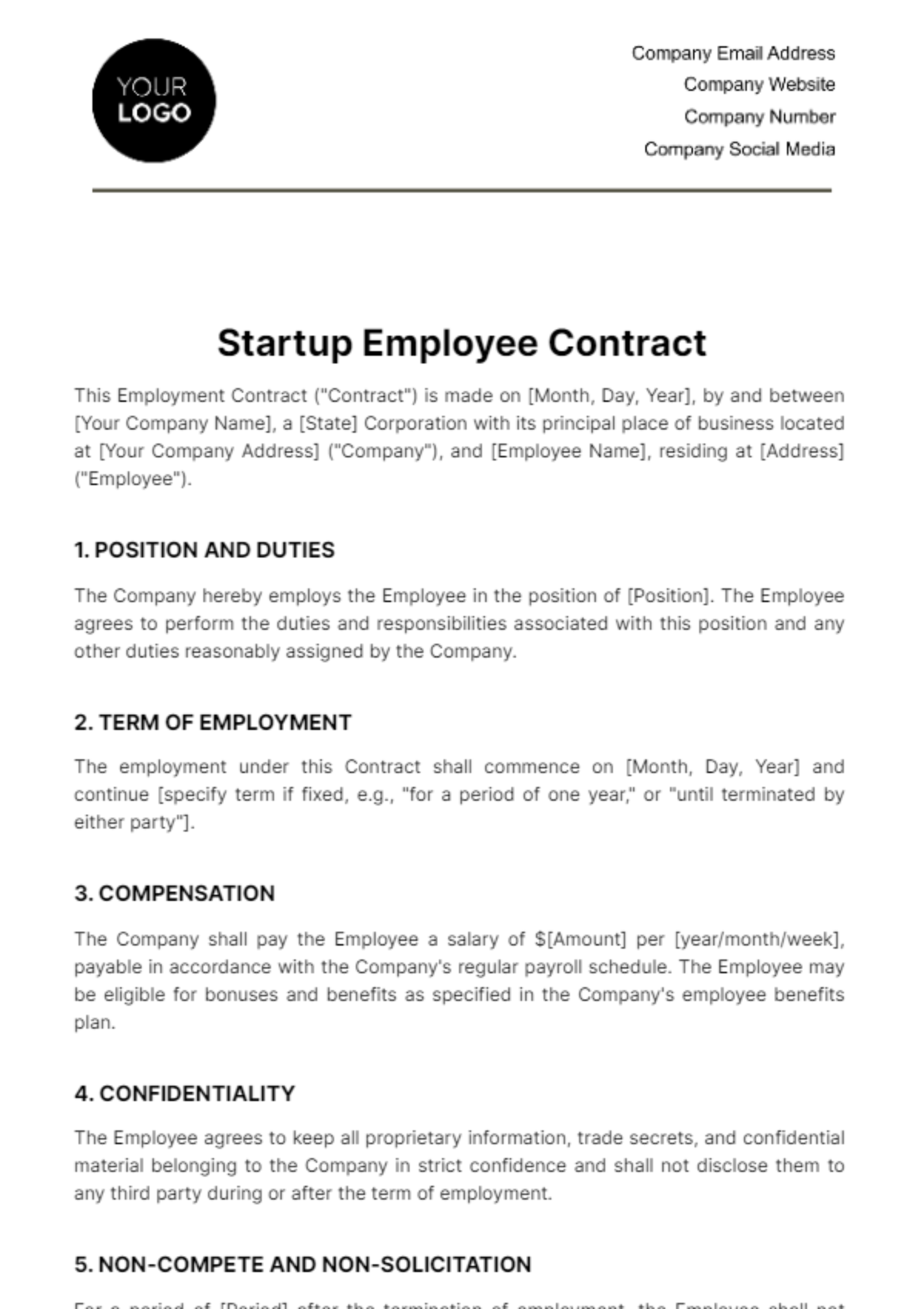Startup Contract
This Startup Contract ("Contract") is entered into as of [Date], by and between [Your Company Name], a [State/Country] corporation with its principal place of business at [Your Company Address] ("[Your Company Name]"), and [Client Name], a [State] corporation with its principal place of business at [Client Address] ("[Partner/Client Name]"). Collectively, [Your Company Name] and [Client Name] shall be referred to as the "Parties."
I. Purpose
This Contract outlines the terms and conditions under which [Your Company Name] and [Client Name] will collaborate to establish, fund, and manage a startup venture ("Startup"). The Startup aims to innovate and excel in primary business activities, with a strategic vision of achieving market leadership and significant profitability by the year 2050. The collaboration will leverage the expertise and resources of both parties to create a successful and sustainable business.
II. Capital Contribution
A. Initial Investment
[Your Company Name] Contribution: [Your Company Name] agrees to contribute an initial capital investment of $500,000 to the Startup. This investment will be allocated to cover essential startup expenses, including product development, initial market research, and operational costs. The capital infusion will enable the Startup to build a solid foundation and kickstart its business operations effectively.
[Client Name] Contribution: [Client Name] agrees to match this investment with an additional $500,000. This contribution will be used similarly for funding startup operations, including hiring key personnel, acquiring necessary technology, and initiating marketing campaigns. This joint investment reflects the commitment of both parties to the success of the Startup.
B. Additional Funding
Funding Round 1: The Startup will have the option to seek additional funding of up to $1,000,000 during the first funding round. This round will aim to attract venture capitalists or other investors who are interested in supporting the Startup's growth trajectory. The terms of this funding will be based on the Startup’s performance, market conditions, and valuation at that time.
Funding Round 2: Should further capital be required, the Startup may pursue a second funding round with a target of up to $2,000,000. This round will be strategically planned to support scaling operations, expanding market reach, and enhancing product offerings. The timing and specific terms of this round will be assessed in relation to the Startup's growth and evolving market opportunities.
III. Ownership and Equity
A. Equity Allocation
Initial Equity Distribution: At the time of the Startup’s formation, the equity distribution will be as follows:
[Your Company Name]: 50% equity ownership
[Client Name]: 50% equity ownership
This equal distribution reflects the balanced contribution of both parties to the Startup and ensures a collaborative approach to decision-making and management.
Vesting Schedule: Equity ownership will vest over a four-year period according to the following schedule:
Year 1: 25% of equity
Year 2: 25% of equity
Year 3: 25% of equity
Year 4: 25% of equity
This vesting schedule aligns the interests of both parties with the long-term success of the Startup and provides incentives for continued commitment and contribution.
B. Future Equity Issuance
Option Pool: The Startup will establish an option pool constituting 10% of the total equity. This pool will be reserved for future hires and key contributors, enabling the Startup to attract and retain top talent. The allocation of options from this pool will be determined by the Board of Directors based on performance and contributions.
Dilution Protection: To protect against excessive dilution of equity, any additional issuance of equity that exceeds 20% of the total outstanding equity will require prior approval from both [Your Company Name] and [Client Name]. This measure ensures that both parties maintain their proportional ownership and influence in the Startup.
IV. Milestones and Deliverables
A. Key Milestones
Product Development: The Startup is expected to complete the development of its minimum viable product (MVP) within 12 months from the date of formation. This milestone includes finalizing product design, engineering, and conducting initial testing to ensure product readiness for market entry.
Market Launch: The Startup will aim to achieve a successful market launch within 18 months. This launch will involve a comprehensive marketing strategy, including promotional activities, public relations efforts, and initial sales efforts to establish a market presence.
Revenue Targets: Within the first 24 months of operation, the Startup is projected to achieve a revenue target of $1,000,000. This target reflects the anticipated market demand and the effectiveness of the Startup's product and marketing strategies.
B. Performance Metrics
Monthly Reports: The Startup will provide detailed performance reports to both [Your Company Name] and [Client Name] on a monthly basis. These reports will include financial statements, key performance indicators (KPIs), and progress updates on achieving the established milestones. Regular reporting will ensure transparency and enable both parties to monitor the Startup’s performance closely.
Quarterly Reviews: A formal review meeting will be held every quarter to assess the Startup’s progress, address any issues, and make necessary adjustments to the business strategy. These reviews will include an evaluation of financial performance, milestone achievements, and market developments.
V. Intellectual Property and Confidentiality
A. Intellectual Property Ownership
Pre-existing IP: Each party retains ownership of any intellectual property developed prior to the formation of the Startup. Any pre-existing IP that will be utilized in the Startup's operations, such as proprietary technology or trademarks, will be licensed to the Startup under a separate agreement. This ensures that both parties maintain their rights to their original innovations while allowing the Startup to benefit from these resources.
New IP: Intellectual property created by the Startup, including patents, trademarks, copyrights, and trade secrets, will be owned by the Startup. Both parties agree to assign any such IP rights developed during the collaboration to the Startup, which will enable the Startup to protect and capitalize on its innovations.
B. Confidentiality Obligations
Non-Disclosure: Both parties agree to maintain the confidentiality of any proprietary information exchanged during the Startup's development. This includes, but is not limited to, business plans, financial data, technical specifications, and any other confidential information shared between the parties. The obligation of confidentiality extends beyond the termination of this Contract.
Return of Information: Upon the termination of this Contract, each party will return or destroy all confidential information received from the other party. This provision ensures that sensitive information is not used beyond the scope of the Startup’s operations and helps protect both parties' proprietary data.
VI. Management and Governance
A. Executive Team
Roles and Responsibilities: The Startup will have an executive team responsible for managing daily operations and executing the business plan. The executive team will include the CEO, CTO, and CFO, each of whom will have specific responsibilities related to business strategy, technology development, and financial management, respectively. The team will work collaboratively to drive the Startup’s success.
Decision-Making Authority: The executive team will have the authority to make operational decisions up to $100,000 without requiring approval from the Board. This threshold allows the team to manage day-to-day expenses and operational needs efficiently. For expenditures exceeding this amount, approval from the Board will be required to ensure alignment with the Startup’s strategic goals.
Reporting and Accountability: The executive team will provide monthly reports to the Board of Directors, including financial performance, progress towards milestones, and any challenges encountered. The Board may request additional reports or conduct audits as needed to ensure proper governance and accountability.
B. Board of Directors
Composition: The Board of Directors will consist of representatives from [Your Company Name], [Client Name], and independent directors with expertise in relevant fields. The inclusion of independent directors will provide objective oversight and guidance to the Startup.
Meetings: The Board will meet on a quarterly basis to review the Startup’s performance, make major decisions, and provide strategic direction. These meetings will be essential for evaluating progress, discussing key issues, and making high-level decisions that impact the Startup’s trajectory.
VII. Exit Strategy
A. Exit Scenarios
Acquisition: In the event that the Startup is acquired by another company, the terms of the acquisition will be negotiated based on the Startup’s valuation at that time. The expected valuation at exit is projected to be between $10,000,000 and $20,000,000. The acquisition terms will be structured to maximize returns for both parties and ensure a smooth transition.
Merger: If the Startup merges with another entity, equity in the merged entity will be converted based on the relative valuations of the merging companies. The combined entity’s valuation is anticipated to be in the range of $15,000,000 to $30,000,000. The terms of the merger will be designed to enhance the value and strategic position of the new entity.
Initial Public Offering (IPO): The Startup may consider pursuing an IPO if market conditions are favorable. The target valuation for the IPO is expected to exceed $25,000,000. An IPO will provide an opportunity for the Startup to raise significant capital and enhance its market presence.
B. Distribution of Proceeds
Pro Rata Basis: In the event of a liquidation or exit, proceeds will be distributed to the Parties on a pro rata basis according to their equity ownership. This ensures that both [Your Company Name] and [Client Name] receive their fair share of the proceeds based on their respective contributions and ownership stakes.
Reinvestment Strategy: A portion of the proceeds may be reinvested into new ventures or opportunities as agreed upon by both parties. This strategic reinvestment will enable the Parties to capitalize on future growth opportunities and continue building on their successful collaboration.
VIII. Term and Termination
A. Term of Agreement
Effective Date: This Contract will become effective as of [Effective Date] and will remain in force for a period of five years. The term may be extended upon mutual agreement by both parties to accommodate the evolving needs of the Startup.
Renewal: Upon expiration of the initial term, the Contract may be renewed for additional periods of two years each, subject to renegotiation of terms and conditions. Renewal discussions will begin at least six months prior to the expiration of the current term to ensure a seamless continuation of the partnership.
B. Termination Conditions
Mutual Agreement: Either party may terminate this Contract by mutual written agreement. Termination by mutual consent allows both parties to exit the partnership amicably and pursue other opportunities.
Breach of Contract: Either party may terminate this Contract in the event of a material breach by the other party, provided that the breach has not been cured within 30 days after written notice. Material breaches include failure to meet key milestones, failure to make capital contributions, or violation of confidentiality obligations.
Force Majeure: This Contract may be terminated if performance is rendered impossible due to events beyond the control of the parties, such as natural disasters, war, or major disruptions. Force majeure events will be documented, and the parties will seek to mitigate the impact on the Startup’s operations.
IX. Dispute Resolution
A. Mediation and Arbitration
Mediation: In the event of a dispute arising from this Contract, the parties agree to first attempt to resolve the issue through mediation. Mediation will be conducted by a qualified mediator mutually agreed upon by the parties. The mediation process will aim to reach a resolution that is fair and satisfactory to both parties.
Arbitration: If mediation fails, the dispute will be resolved through binding arbitration. The arbitration will be conducted in accordance with the rules of the [Arbitration Institution], and the decision of the arbitrator will be final and binding. Arbitration provides a formal mechanism for resolving disputes and ensures a timely resolution.
B. Governing Law
This Contract will be governed by and construed in accordance with the laws of [State]. The chosen jurisdiction will ensure that any legal proceedings related to the Contract are conducted in a consistent and predictable legal environment.
X. Miscellaneous
A. Entire Agreement
This Contract constitutes the entire agreement between the parties and supersedes all prior agreements, understandings, and representations. Any modifications or amendments to this Contract must be made in writing and signed by both parties.
B. Severability
If any provision of this Contract is found to be invalid or unenforceable, the remaining provisions will continue in full force and effect. The parties will negotiate in good faith to replace the invalid provision with a valid one that reflects the original intent.
C. Notices
All notices under this Contract must be in writing and sent to the addresses listed above. Notices may be delivered by hand, email, or registered mail. The parties agree to promptly notify each other of any changes in their contact information.
IN WITNESS WHEREOF, the parties have executed this Contract as of the date first written above.
[Your Company Name]
Name: [Your Name]
Title: [Your Title]
Date:
[Client Name]
Name: [Client Name]
Title: [Client Title]
Date:
